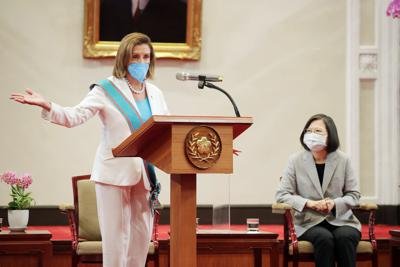By: Girish Linganna
At a meeting with US Secretary of State Antony Blinken in Beijing on Monday, June 19, 2023, Chinese President Xi Jinping has stated that the world required a stable US-China relationship and that the two countries should handle ties responsibly, according to state broadcaster China Central Television (CCTV). China will neither challenge, nor replace the US and Washington should respect Beijing and not hurt its legitimate rights and interests, Chinese President Xi Jinping said, urging the two world powers to overcome obstacles and repair tense relations.
“Whether China and the US can get along correctly has an impact on the future and destiny of humanity,” he said, adding that each country’s prosperity should be viewed as an opportunity rather than a threat. The Chinese leader stated that countries throughout the world had expressed concern about deteriorating US-China relations and that they did not want to see conflict or confrontation between the two great powers. Neither side can change the other to fit its own needs, let alone stop the other from growing as it should.
There are growing concerns that the two largest economies in the world may engage in a military conflict, with Taiwan being one of the potential flashpoints. As the island approaches a presidential election next year, calls for re-engagement and communication have got louder.
Blinken later reciprocated, saying he hoped for and expected more communication and engagement moving forward. “And I believe that, over the past few days, we’ve made progress in that direction. Progress is difficult, requires time and cannot be achieved in a single visit, travel, or talk,” he stated. “The discussions we held, in my opinion, were frank, in-depth and, in some cases, fruitful; in other cases, we still have a lot of work to do.”
US President Joe Biden, on his part was effusive in his praise of Blinken and stated that he thought relations between the two countries were on the right path, indicating the progress made during Blinken’s trip. When reporters asked him if he felt progress had been made, he replied, “I don’t feel. You know it’s been made. He did a hell of a job!”
Other top US officials are expected to visit China in the coming weeks. Janet Yellen, US Treasury Secretary, and Gina Raimondo, US Secretary of Commerce – both expressed a desire to visit China this year. Matthew Miller, State Department spokesman, said the two sides had agreed to continue talking about creating guiding principles for their bilateral relationship and urged more advancement, especially through the joint working groups.
Both sides stressed the importance of cooperating in order to tackle issues including global macro-economic stability, food security, public health and drug enforcement that affect both domestic and foreign policy.
While Xi said agreements on “some specific issues” had been reached in the Secretary of State’s earlier discussions with China’s top diplomat, Wang Yi, and Foreign Minister Qin Gang and that China wished for the restoration of “healthy and stable” relations with the US the US State Department went on record to say that Blinken had visited Beijing because US President Joe Biden believed both the US and China had “obligation and responsibility” to manage bilateral relations.
According to the Chinese statement on the meeting, Blinken stated that Washington did not want a new Cold War, nor did it wish to modify China’s system or oppose Beijing by developing alliances.
While the deliverables of Blinken’s trip were modest, both countries used it to help stabilize ties that had been “lurching towards dangerously intense confrontation”, according to Daniel Russel, former assistant secretary of state for East Asian and Pacific affairs at the US State Department. “Both sides expected Blinken’s visit to lower the temperature, not to resolve fundamental disagreements,” he added.
In keeping with Biden’s laudatory remarks, Blinken, in fact, exceeded expectations by meeting Xi, holding extensive discussions with top Chinese officials and unclogging the pipeline of official bilateral contacts, according to Russel, who is vice-president for international security and diplomacy at the Asia Society Policy Institute. He also highlighted that both sides’ public pronouncements were mainly constructive.
What was important on Blinken’s visit was the reaffirmation that both the sides discussed the ‘fundamental principles’ that should guide the relationship. While it seems unlikely that Washington would bend to Chinese obfuscations, such as ‘mutual respect and win-win cooperation’, or that China would commit to concrete principles, such as ‘freedom of the seas’, engaging in this kind of strategic dialogue is essentially an infallible tool for smoothening ruffled feathers.
According to Zhu Feng, an international affairs professor specializing in US-China relations at Nanjing University, President Xi’s meeting with Blinken shows the importance that China’s upper echelons place on his visit. “The engagement with Minister Qin Gang was a preliminary stage. The meeting with Xi clearly indicates that it’s a highly political discussion,” he says.
Earlier in the day, Wang Yi, top foreign policy adviser of Xi, encouraged the US to “reflect deeply” on its differences with Beijing, blaming deteriorating relations on Washington’s “erroneous perception” of China. Wang urged the US to end unilateral sanctions against China, cease stifling China’s technology growth and refrain from interfering in Beijing’s ‘internal affairs’. On Taiwan, Wang emphasised that preserving its national unity would always be at the heart of China’s vital interests, with “no room for compromise”.
Blinken’s discussion with Wang came a day after he met Qin and both parties described the nearly six-hour encounter as “candid” and “constructive”. While urging the two countries to maintain high-level contacts, Qin warned that Taiwan was “the core of China’s core interests” and posed the “most prominent risk” to bilateral relations. Beijing regards self-ruled Taiwan as a ‘renegade’ province that must be subdued – by force, if necessary. Washington, on the other hand, opposes any move to seize the island by force.
Blinken had planned to visit China earlier, but had to cancel his trip after a suspected Chinese spy balloon soared over American soil in February. (IPA Service)







